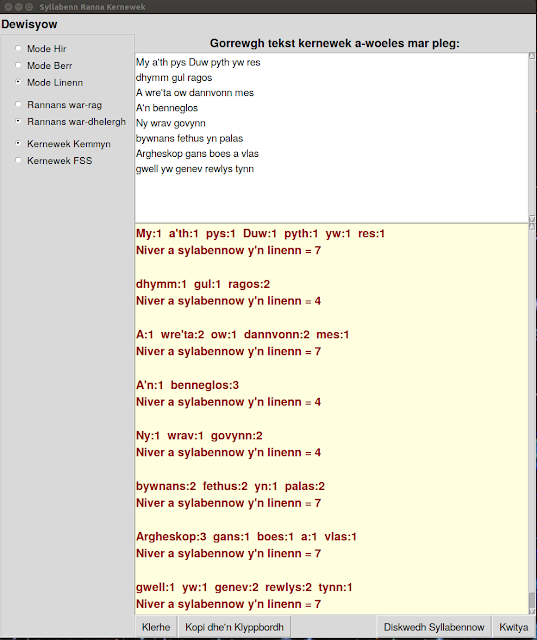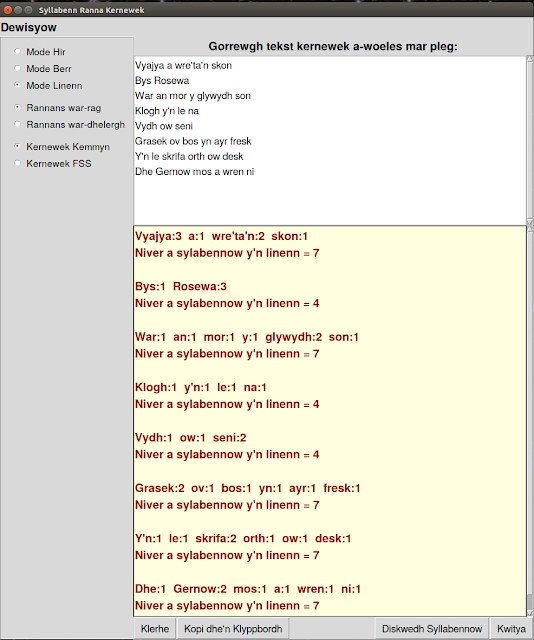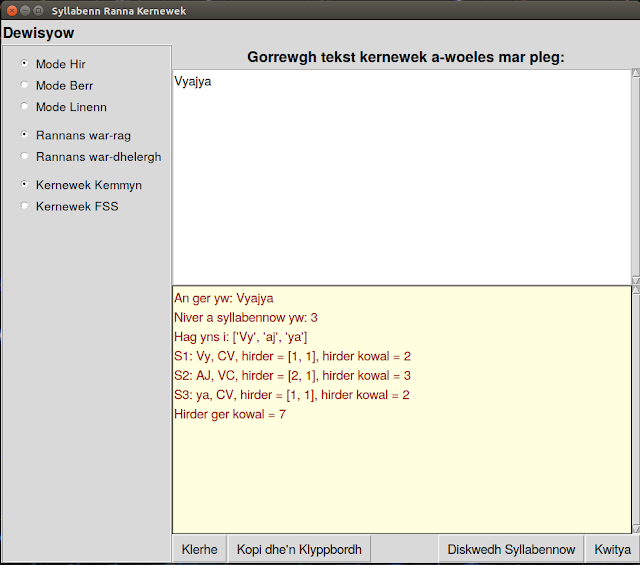Pennseythun Gernewek 2017
Tags: translationkernewekcornish language20 Jun 2017 - MawKernewek
Back in April I attended the Pennseythun Gernewek, the annual Cornish language weekend run by Kowethas an Yeth Kernewek where Cornish speakers from around Cornwall, and beyond gather to speak the language, and participate in lessons and activities. There is something for every level of previous knowledge of the language, from Dallethoryon Lan (complete beginners) to Bagas Freth (the fluent speakers group). I definitely recommend it.
A couple of things that Bagas Freth did this year was a talk by Ken George on translating song lyrics into Cornish, and a workshop on composing a part of the lost part of Bewnans Ke (events taking place during the missing part of the manuscript before the portion that was preserved).
7 My a'th pys Duw pyth yw res A
4 dhymm gul ragos B
7 A wre'ta ow dannvonn mes A
4 A'n benneglos B
4 Ny wrav govynn C
7 bywnans fethus yn palas D
7 Argheskop gans boes a vlas D
7 gwell yw genev rewlys tynn C
7 Vyajya a wre'ta'n skon A
4 Bys Rosewa B
7 War an mor y glywydh son A
4 Klogh y'n le na B
4 Vydh ow seni C
7 Grasek ov bos yn ayr fresk D
7 Y'n le skrifa orth ow desk D
7 Dhe Gernow mos a wren ni C
The numbers at the left are the number of syllables, and the letters at the right mark the rhymes.
There are two formats used in Bewnans Ke that we followed in composing these stanzas. This had a structure of 7, 4, 7, 4, 4, 7, 7,7 syllables per line. The other possible structure was 7,7,7,7,4,7,7,7. With either of these structures either one person was speaking for all 8 lines, or person 1 for 5 lines and person 2 for 3. In the first of the stanzas above, it is all Ke speaking, and the second has 5 lines of God in reply and 3 with Ke again.
A broad translation is as follows:
I pray God what must I do for thee. Will you send me away from the cathedral?
I do not ask for a luxurious life in an archbishops palace with fine food. I prefer a strict rule.
You will voyage soon, to Rosewa (placename, meaning the Roseland?) On the sea you will hear a sound of a bell ringing there.
I am grateful to be in fresh air rather than writing at my desk. To Cornwall we will go.
One group got a song in French "Charles Trenet - La Mer" which I think was quite a difficult challenge for them. I don't have a copy here of what they came up with.
I was part of a group working on Moon River (Louis Armstrong).
With a bit of artistic licence and adaptation:
A couple of things that Bagas Freth did this year was a talk by Ken George on translating song lyrics into Cornish, and a workshop on composing a part of the lost part of Bewnans Ke (events taking place during the missing part of the manuscript before the portion that was preserved).
Bewnans Ke an Blydhynnyow Kellys
We divided into groups and composed several stanzas covering Ke in his time in Brittany before his coming to Cornwall. I partly composed this:7 My a'th pys Duw pyth yw res A
4 dhymm gul ragos B
7 A wre'ta ow dannvonn mes A
4 A'n benneglos B
4 Ny wrav govynn C
7 bywnans fethus yn palas D
7 Argheskop gans boes a vlas D
7 gwell yw genev rewlys tynn C
7 Vyajya a wre'ta'n skon A
4 Bys Rosewa B
7 War an mor y glywydh son A
4 Klogh y'n le na B
4 Vydh ow seni C
7 Grasek ov bos yn ayr fresk D
7 Y'n le skrifa orth ow desk D
7 Dhe Gernow mos a wren ni C
The numbers at the left are the number of syllables, and the letters at the right mark the rhymes.
There are two formats used in Bewnans Ke that we followed in composing these stanzas. This had a structure of 7, 4, 7, 4, 4, 7, 7,7 syllables per line. The other possible structure was 7,7,7,7,4,7,7,7. With either of these structures either one person was speaking for all 8 lines, or person 1 for 5 lines and person 2 for 3. In the first of the stanzas above, it is all Ke speaking, and the second has 5 lines of God in reply and 3 with Ke again.
A broad translation is as follows:
I pray God what must I do for thee. Will you send me away from the cathedral?
I do not ask for a luxurious life in an archbishops palace with fine food. I prefer a strict rule.
You will voyage soon, to Rosewa (placename, meaning the Roseland?) On the sea you will hear a sound of a bell ringing there.
I am grateful to be in fresh air rather than writing at my desk. To Cornwall we will go.
 |
| Output of taklow-kernewek syllable segmentation tool. |
 |
| Output of taklow-kernewek syllable segmentation tool. I changed to forward segmentation due to an issue with the word 'vyajya' see below. |
 |
| Detailed output for 'Vyajya' - forward segmentation. The regular expression starts at the beginning of the word and works forwards. |
Song lyrics
In another of the sessions, Ken George covered some aspects of translating a song, including observing its metre and rhyme, and the different styles of rhyme in songs. After the talk, we divided into smaller groups and tried translating a song each.One group got a song in French "Charles Trenet - La Mer" which I think was quite a difficult challenge for them. I don't have a copy here of what they came up with.
I was part of a group working on Moon River (Louis Armstrong).
With a bit of artistic licence and adaptation:
Original
Moon river, wider than a mile
I'm crossing you in style some day
Oh, dream maker, you heart breaker
Wherever you're goin', I'm goin' your way
Two drifters, off to see the world
There's such a lot of world to see
We're after the same rainbow's end, waitin' 'round the bend
My huckleberry friend, moon river, and me
I'm crossing you in style some day
Oh, dream maker, you heart breaker
Wherever you're goin', I'm goin' your way
Two drifters, off to see the world
There's such a lot of world to see
We're after the same rainbow's end, waitin' 'round the bend
My huckleberry friend, moon river, and me
Noting rhymes
mile, style
day, way
maker, breaker
world, world
see, me
end, bend, friend
Translation/Adaptation
Dowr Tamar, moy es mildir bras
Y treusyav dha dhowr glas neb jydh
Ty a wra hunros, mestres fell dell os
Pub le a wre'ta mos, ena my a vydh
Dew wandror mos a-dro dhe'n bys
Meur a'n norvys a welyn ni
Ni a helgh penn kammneves, ni a wort a-dro dhe'n kamm
Ha my a wra ri dhis amm
Dowr Tamar, ha my.
